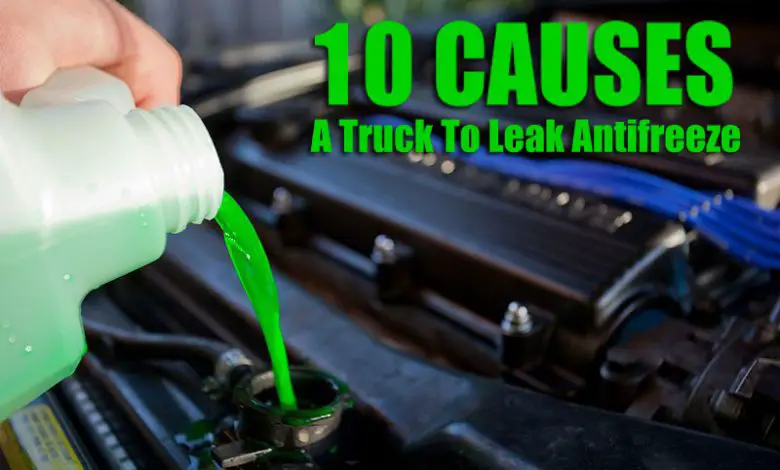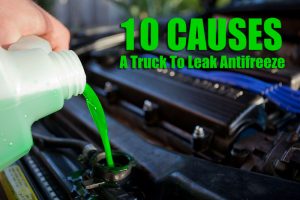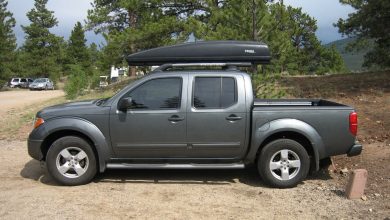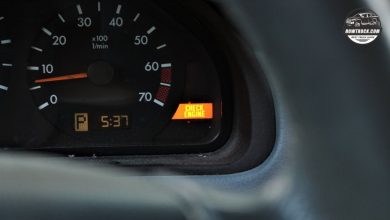What Causes a Truck to Leak Antifreeze

An antifreeze leakage can occur at any point inside the truck cooling system. You should detect an antifreeze leak while it dribbles, splashes, or spurs from the spilling portion.
It can disturb the freezing point of a liquid circulating the engine of a vehicle. An anti-freeze plays an important role in keeping your truck running appropriately, so it is vital to know about its leakage. If your vehicle is spilling antifreeze, the issue has to be inspected promptly.
What causes a truck to leak antifreeze? The leakage in the cap of the radiator is one of the most common causes of antifreeze leakage in trucks. Possibilities of Internal and external leakage in the head or block maybe results in the same problem. Possibilities of culprit radiator hoses and damaged reservoir can also cause the anti-freeze to leak while the truck is running. Moreover, other reasons for anti-freeze leakage include leakage from a water pump, heater core, or engine freeze plugs.
Antifreeze can leak from many components of a truck engine however, there are a few frequent aspects to test right away when you mostly notice a lower coolant level.

As a facet note, you can use distilled water for coolant in emergencies. It can keep your truck moving smoothly even when the temperature is too high or too low, below the freezing point.
If you own a truck, even if you don’t have any idea about its maintenance you might have experienced antifreeze leakage.
What causes a truck to leak antifreeze?
There are mostly nine common causes that make a truck leak antifreeze and how these causes can be fixed are described below.
Each cause has its chances of occurrence and extremity level. You may additionally note that anti-freeze has accumulated on the floor under your truck and the reservoir tank is no longer as high as it should be.
This should be the evidence of a slow leakage. Overheating the engine is another symptom that you may also be going to face an anti-freeze leak. Sometimes it is easy to locate the leakage point but most often it takes a lot of effort.
Antifreeze Leakage in The Radiator Cap
A radiator is a pressurized device, if there is a loss of pressure from the cap that doesn’t fit properly and an incorrect cap has been placed on it, the leakage could occur due to the loss of pressure.
This can be identified by testing the cap pressure. It can also be caused by a leaky or loose cap of the radiator which results in the antifreeze overflow from the tube when it heats up.
Leakage in The Radiator
There is a possibility that a radiator itself might be leaking due to cracks in it. If you are facing this problem then you should move to get it taken care of as early as possible and need to replace the radiator.
Internal Leakage
The internal leakage could be triggered by a leak in the head or block or maybe a leaky head gasket that gets away from the system of anti-freeze.
An internal leak may not cause an anti-freeze underneath your truck. Instead, it will be apparent to notice when your anti-freeze degree does not remain constant and you feel that you constantly refill the tank to keep your engine from overheating.
External Leakage
It is the most easily identified type of leakage. The antifreeze gets away from your truck and it quickly overheats when you experience external leakage.
Moreover, you can easily locate the point from where the liquid is coming out by just have a look. For example from a broken hose or hole in the radiator.
Damaged Radiator Hoses
It is a device made up of rubber that controls the anti-freeze flow in the water pump of the engine and the radiator. It can break or split over time, so intently investigate the length of your hoses for any harm. Hose clamps that associate the hose to the radiator can likewise fizzle with expanded use.
Cracks or Splits in Reservoir
A reservoir in a truck is a container that holds liquid used for the normal functioning of the vehicle. It is a place where you add antifreeze which travels to the radiator.
If the reservoir has small holes or cracks, the anti-freeze will leak out slowly. In such cases, it should be replaced with the new one or should be inspected by a professional mechanic.
Spillage from Water Pump
Leakage from any portion of the vehicle is considered terrible, all the time. On the off chance that you discover fluid of any color on the floor right close to your truck, the water pump is the suspect. Anti-freeze is assumed to pour into the shaft, which eventually locks the shaft to turn.
Fault in The Heater Core
The heater core is a radiator-like device that is present inside or sometimes outside the cabin of the truck. Hot anti-freeze from the engine is passed through the tubes of the heater core.
If the heater core is experiencing leakage you may discover anti-freeze on the floorboards of the truck, mostly on the traveler’s side.
Changing the heater core can be costly and monotonous work requiring the expulsion of a particular portion of the insides of your truck. You can buy heater core from Amazon using our affiliate link.
Spillage from Engine Freeze Plugs
It also called frost or core plugs avoids anti-freeze from spilling. Freeze plugs are exceptionally special for the maintenance of the truck, particularly in hotter climates.
Freeze plug leakage causes slow cooling of the system. So if you have got anti-freeze spilling down the side of your truck or from the gap in the bell housing, between the engine and the transmission, you likely have a terrible freeze plug issue.
Inspecting your truck engine and all the parts mentioned above is an essential step is being arranged especially in winter. There is nothing more regrettable than being stranded with an issue that might have been avoided.
Read also;
How Long Should Ball Joints Last on a Truck




